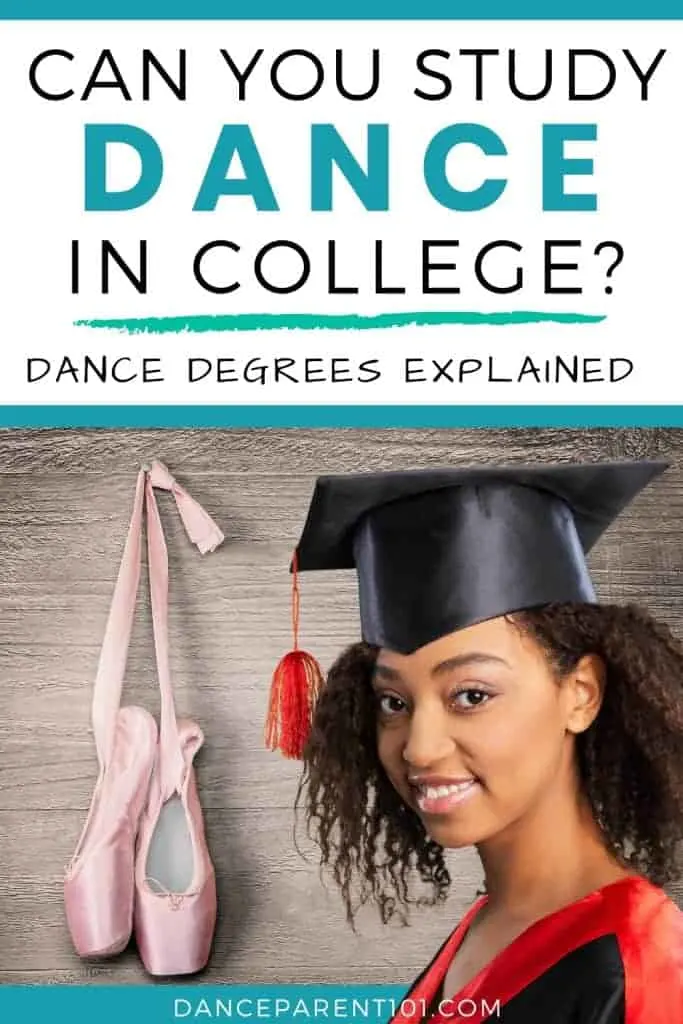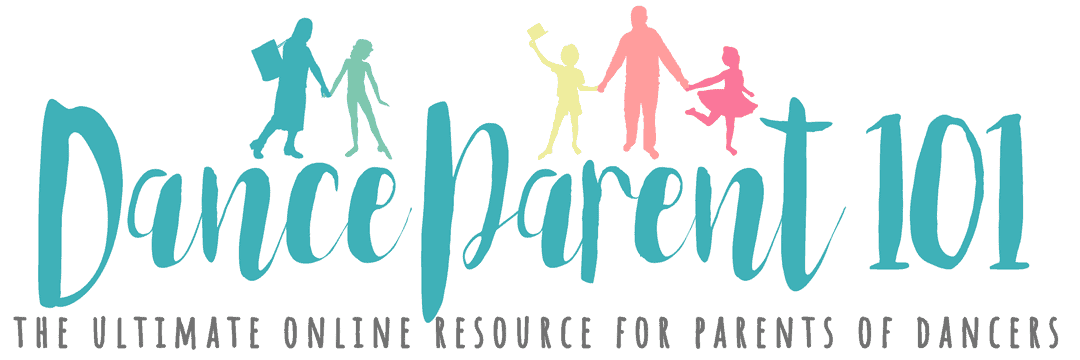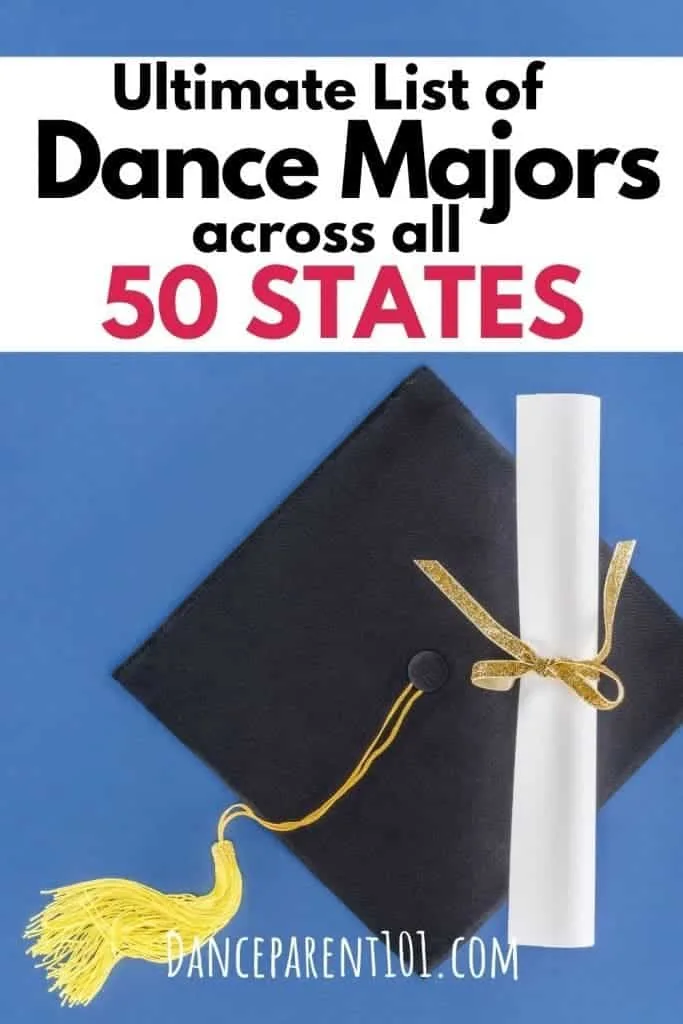
Whether you are already an experienced dancer or someone who has wanted to dance all their lives you might not be aware that you can study and major in dance as part of an undergraduate college or university degree in the US and many other countries, or for that fact what a major even is or what a dance major even studies.
A Dance Major is a focused area of learning in dance at college where you study technique classes in ballet, modern, jazz or tap dance, academic lessons in subjects like dance history and kinesiology, and practical classes in stagecraft, production or choreography.
I studied dance at university many MANY years ago! I majored in Dance and Drama, but the courses of study were very limited and I left after my first year to study at a privately run pre-professional school that offered jazz, tap, hip hop, commercial and musical theatre dance classes as I wanted to work in film clips, on tv and in musical theatre – which I was lucky enough to do (check out my author bio here). Today university dance programs have evolved to not just offer creative dance courses focused on history, theory and choreography but offer courses in almost every style and type of dance known to the western world! It was so interesting researching and learning about all the different types of dance that can be studied as part of a dance major in 2020 and beyond and I hope you find it just as interesting as well!
What is a Major?
A major is an area of study in one subject area that students study as part of a Bachelor’s degree. To obtain a Bachelor of Art or Bachelor of Science degree in the US, undergraduate students generally need to obtain around 120 credits of study over four years. Each individual course of study is normally worth 3 credits and requires you to attend around 15 hours of classes. A major requires 40-50 of those credits to be studied in one subject area such as dance.
If you are completing a Bachelor of Fine Arts degree you will find that the major credits requirement is higher. A BFA requires a more focused study of a subject and therefore more in-depth study is required.
Confused about what a Bachelor’s Degree is, what the difference is between a BA or BFA in dance or what you study to make up all the other credits in a dance degree? Check out our article Dance Degrees Explained – it will open up in a new tab or click here to save the link to Pinterest to read later.
What is a Dance Major?
The term ‘dance major’ can be used to describe both a course of study in dance at college, as well as be used to describe the person doing the course of study in dance at college. So I will explain both uses of the term.
As an Area of Study:
A dance major is 40-50 credit or unit points in dance studies (usually more, around 70 in a major for a BFA degree). That is around 200-250 hours of classes and lessons in dance over four years, not including any of the performance work, rehearsals, homework and study that is needed to fulfill the coursework in your own time. On top of any academic requirements, an Audition is generally required to be accepted into a dance program at college and university which offers the courses that dance majors study.
‘I am studying a dance major in college’
As a description of a student in College:
Students in college use the term ‘dance major’ to describe themselves and what they are doing at college. It simply lets others know they have declared to the university that they are committed to studying 40-50 credit points of their degree (more in a BFA) to dance studies.
Being a ‘dance major’ can become a kind of persona as you are living the life of a dance major and there are plenty of stereotypes and memes out there about what it is like to be a dance major. For example, saying you are a dance major helps to quickly relay to others that you are not being anti-social because you can’t make it to a party or social gathering, but that you have a genuine reason and excuse such as rehearsals or a performance or extra technique classes.
‘Sorry, I can’t make it, I’m a dance major!’
What is the difference between a Minor and a Major in Dance
A minor is a focused area of study that requires 15-30 credits to complete. It does not come up in the title of your degree and most dance minor programs are a reduced (or minor) version of the dance major program. In those cases it would make no sense nor would it be possible to do both the minor and major in dance as you can’t use the same course work to double your credits. (See the related questions section at the bottom of this article for more information about dance minors.)
Dance Major Requirements
A dance major will follow an academic degree plan or map that has a list of required or core courses a student must take and pass to be able to graduate as a dance major.
From my research, most programs include at least ballet or modern dance technique classes as well as academic classes in dance theory and history as part of their required studies.
But each dance program will have a unique set of core subjects dependent on the specialties of the dance department faculty and even the college location. For example, if the dance department has a professor who is a proficient tap dancer, aerial artist or ballroom dancer then these styles of dance may make up part of the core required studies of the dance major or might form a minor, concentration or elective subject that can be studied alongside the major.
The University of Hawai’i at Manoa in Hawai’i is an example of how location and culture can play a part in what might be taught within a dance major as Asian and Pacific Dance classes are required course of study in the dance program. Another example is the fact that several dance programs at universities in New Mexico offer minors and concentrations in Flamenco and Spanish Dance which is not as common to see in other universities around the US.
What classes do dance majors take?
The following list is a good example of the different types of courses of study available within a dance major but it is not exhaustive, meaning that there are courses of study offered but not listed here mainly because they are unique offerings in a program, for example, the Glorya Kaufman School Of Dance degree program at USC offer an elective DANC 191 Gaga: Dancers within their Choreography for Stage and Screen Concentration. Please also note, that different colleges will call their classes by slightly different names and will teach them in different ways, for example, one college might base their improvisation technique classes in modern dance, whilst another works on improvisation in the hip hop genre.
| Technique Classes | Academic Classes | Practical Classes (a mixture of both) |
|---|---|---|
| Asian Dance Aerial Dance African Dance (West African, Afro Cuban etc..) Ballet/ Classical Ballet Ballroom Bollywood Dance Broadway Capoeira: Brazillian Dance Classical Indian Dance Contemporary Commerical Dance Dance Sport Flamenco Hip Hop Indonesian Dance Jazz Middle Eastern Dance Modern or Post Modern Dance Musical Theatre Pacific Dance Partnering/Pas de Deux Social Dance Spanish Dance Tap Theatre Dance | Anatomy Critical Approaches to Dance Dance for Children Dance Leadership and Entrepreneurship Dance Science – Analysis of Movement Fitness and Injury Prevention Global or world Perspectives in Dance History of Dance Historical approaches to dance studies/performance Human Physiology Introduction to Dance Studies Music Studies for Dancers Notation Nutrition Pedagogy – Ballet Pedagogy – Dance Somatic Awareness Theories and Methods in Dance Composition The Role of the Artist in Society World Dance Histories 21st Century Dance | Acting for Dancers Alexander Technique Experiential Anatomy Experience in Technical Production Career Preparation Choreograpy Collaboration Conditioning for Dancers Composition Design for Dance Lighting Design for Dance Costumes Dunham Technique Improvisation Kinesiology Makeup Techniques and Application Movement Analysis Movement practice Performance Studies Professional Dance Preparation Pilates Placement for the dancer Production Repertory and Perfomance Screen/Camera Dance and Sound Design Somatics Stagecraft Teaching Dance |
The Different Types of Dance Majors and Dance Programs
With the variety of classes available, if you are wanting to major in dance at university when you start your college selection one of the things you will need to research is the type of dance major each of the institutions you are interested in attending offer.
Most offer a standard dance major that covers all the basic to advanced elements of dance which I describe in detail a bit further on in the article. Other college degrees are very specific and label their program as a Major in Ballet or A Major in Modern Dance and you receive a BA in Ballet or a BFA in Modern Dance for example. But many other dance programs offer what is called a concentration, emphasis or track that you can follow as under the dance major umbrella where you specialize within your dance studies.
What is a concentration in a major? (emphasis or track)
A concentration sometimes called an emphasis or track, dependent on the university, is a specialization of your studies within a focused area. All dance major students will have core studies required for them to complete their major, but if a concentration is available, the dance department faculty will have created a degree plan or map for you to follow with a selection of elective subjects that together create a focused area of study or concentration.
How is a concentration different to a minor?
At some colleges, a minor in dance is just a reduced version of the dance major.
At other universities with large dance departments or specialty teachers, minors may be provided in different types, styles or ways to academically study dance such as a Minor in Spanish Dance, Hip-Hop or Commercial Dance or a Minor in Somatics or Dance History which is not covered in your dance major studies, therefore, you can take them alongside your major. In some cases, these minor studies are what make up the concentration or emphasis part of a dance degree but at other colleges, the concentration is built around a selection of elective subjects.
What are the different types of Minors, Concentrations, Emphasis or Tracks you can study in Dance?
The following list of minors, concentrations, emphasis’ and tracks have been taken from the research I completed for the article Dance Colleges Across All 50 States: The Ultimate List with Links. Colleges and Universities will offer different minors and concentrations based on the experience, education, and specialties of the faculty – the teachers and professors they have available to their dance program or their ability to combine experience and learning through different departments of their university.
| Concentrations/Emphasis/Track | Minors |
|---|---|
| Arts Administration Ballet Ballroom Dance Body, Science and Motion Choreography Choreography for Stage and Screen Commercial Dance Contemporary Creative Expression or Process Dance and Music Education Education with Licensure or Certificate for k-12 or 6-12 Dance in Community Dance of the 20th & 21st Centuries Dance Sport Dance Science Dance Studio Operations Human Movement in its Cultural Context Management Media Modern Dance Movement Studies Movement Sciences Musical Theatre Pedagogy Performance and Choreography Performance Studies Physical Therapy Pre-Movement Therapy Production and Management Occupational Therapy Research Spanish Dance Studio Operations Theatre/Dance Theory | Africana Theatre and Dance Arts Adminstration Arts Leadership & Administration Choreography Choreography & Perfomance Contemporary Dance Performance Creative Arts (music, theatre, dance) Dance Appreciation Dance Education Dance History Dance History and Theory Dance in Popular Culture: Hip-Hop, Urban and Social Dances Dance/Movement Dance Pedagogy Dance Performance Dance Production Dance Studio Administration Dance Studio Management Dance Somatic Studies Dance Teaching Dance Technique Dance Therapy Flamenco Integrated Performing Arts Kinesiology Movement Studies Musical Theatre Performing Arts Somatics Somatic Studies and Wellness Somatic Sustainability Studio and Community Dance Teaching Artist Teacher Licensure Theatre Arts (Dance Program) Theatre & Dance Theatre Dance Theatre performance – Muscial Theatre World Dance |
TIP: If you want to know which institutions offer the above minors and concentrations check out the article Dance Colleges Across All 50 States: The Ultimate List with Links . Use the find function in your internet browser to search for the key phrase of the concentration or minor for example ‘occupational therapy’ or even just type in the word ‘occupational’ by using the Find function in your internet browser. I use chrome so the short keys to get the finder is control-f. On a Mac, you can use command-f.

Related Questions
How do you become a dance major?
To major in dance, you will need to apply to the college or university you would like to study at and fulfill their academic requirements to be accepted as a student at their institution. This is because a degree in dance such as a Bachelor of Arts will require you to take and pass general education studies in addition to your dance studies. Additionally, you will more than likely have to attend a dance audition to be accepted into the dance department which may also have separate requirements for you to fulfill such as a personal statement essay or a sample research paper. Use the links from our article Dance Colleges Across All 50 States to check the admissions policies for the college you would like to attend for their most current application procedures.
Can you major in dance with no experience?
You can major in dance with no experience if you pass the audition for entry into the college dance program or if the college has no audition prerequisites for entry into their dance courses. Some institutions offer beginner classes and are more movement and creative based than technical. For more information check out our article on the topic here where we also have a list of colleges that do not require an audition for entry into their dance programs.
Why do people major in dance?
People major in dance for many reasons and not only to increase their skills to become a professional dancer. Some people study a major in dance as a part of their teaching degree, others want to work in arts administration, some want to increase their production or choreographic knowledge and skills, others take dance because they are working towards becoming a physiotherapist or psychologist, aged carer, kinesiologist, sports coach or even biologist and find dance studies increase their understanding of human movement. For others, they enroll in a dance major because of the pure joy and creative expression that dancing gives them and the hope that mixed with other academic studies they will find their calling.
Why do a minor and not major in dance?
Many people choose to minor and not major in dance and vice versa for many reasons which I outline in the following table:
| Reasons for Choosing to Major in Dance | Reasons for choosing to Minor In Dance |
|---|---|
| They have danced all their lives and intend on making a career in dance in some form whether it be as a professional dancer , a teacher, choreographer, an arts administrator or in any other of the many careers dancers can choose to pursue. | They danced all their lives, but are going to college because they are equally passionate about something else such as wanting to get into law school, computer science, medical school or any other course, but still want to pursue their creativeness and love of dance, just not as a major. |
| They want to teach dance in the public school system and a major in dance along with educational studies at university will help them attain certification. | They have always wanted to dance, but never had the opportunity to do so and decide to give it a go at college. |
| To be able to go onto further studies in the area of dance such as completing a Masters degree and then Doctoral Degree. | As a creative outlet from an otherwise extremely academic study workload. |
| Because they have danced all their lives, they cannot think of doing anything else in their lives and so majoring in dance at college is a no brainer and hopefully will bring them more clarity in which direction they would like to go in the future. | Because they love to dance, but don’t want to major in it because they feel it is an unstable industry and want a more secure career opportunities in the future. |
| They are studying physical education, physiotherapy, biology or kinesiology or another complementary major. | |
| As part of a degree in theatre studies. |
Is it hard to minor in dance?
Whether a minor in dance is hard or not to complete will depend on the course available at the college you want to study at. Some colleges offer beginners’ lessons as part of the minor to entice students from all different streams of the university to study dance. Some also offer beginners lessons as an elective rather than a minor which you can obtain credits for to put towards your degree.
At other institutions, the minor is aimed at providing experienced dancers from for example a theatre major that has a concentration in musical theatre to be ready to audition and work professionally on stage.
You need to research the dance programs for the dance minor of different colleges to find out what each one offers as some cater for beginners and others do not.
What colleges have dance majors?
Every state in the US has at least one college with a dance program, but not every state has a dance major available. There are a few states with colleges that only offer dance as a minor. For a complete list check out our article by clicking on the image which will open up in a new tab or click here to pin it to read later.
Dance Major Jobs
There are literally hundreds of different jobs and careers a graduate with a bachelor’s degree and a major in dance or further education might be right for. You just have to remember that a dance major does not pigeon hole you into having to become only a professional dancer, but that the skills you can learn from dancing can be transferred into many different areas. For more ideas check out some of our articles about careers in dance or pin from here to read latter.



